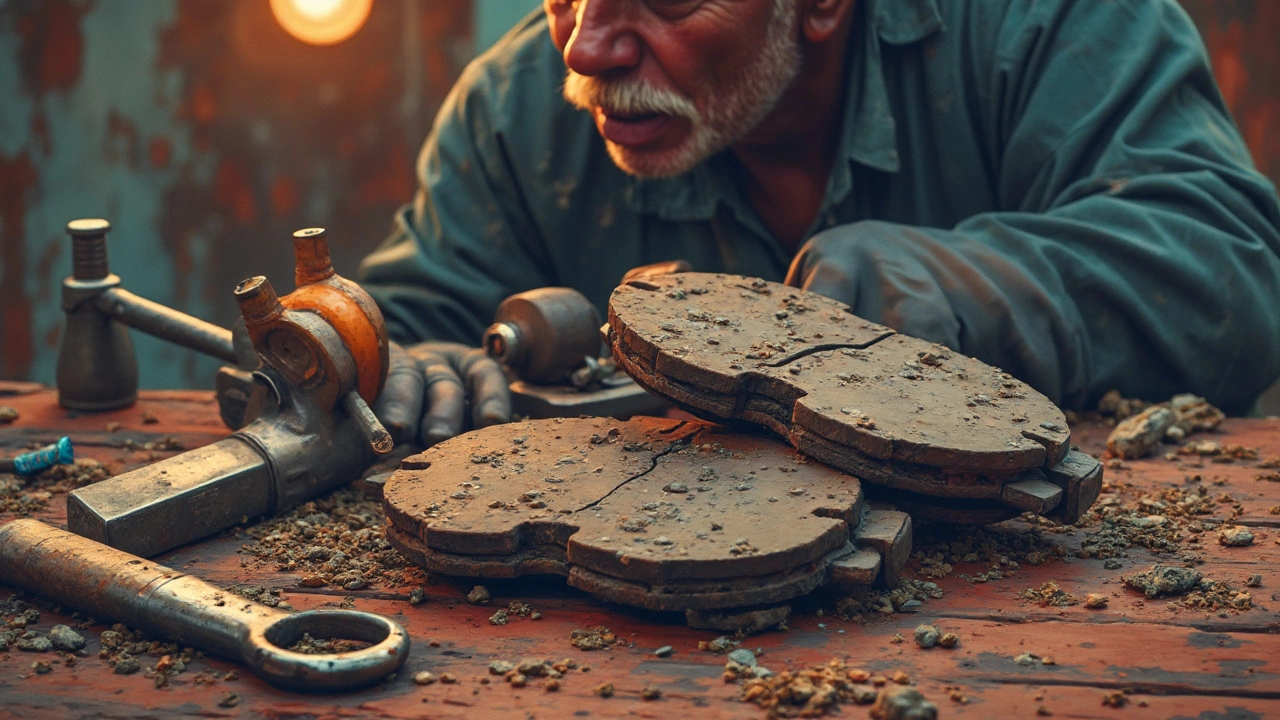 Apr, 11 2025
Apr, 11 2025
So you're wondering if it's really a big deal to drive around with dodgy brake pads? Let me tell you, buddy, it absolutely is. Bad brake pads are like worn-out sneakers—sure, they might still work for a while, but they're not doing you any favors in the long run. Their job is to create friction against the brake rotor, helping your car stop when you press the pedal. Without them in top shape, stopping becomes a guessing game.
Think about what happens when brakes fail you. Imagine needing to stop quickly at a red light or because some wild animal decides to dash across the road. When brake pads aren't up to snuff, your stopping distance becomes longer, and let's be real, that’s not ideal, especially during Hamilton’s unpredictable weather.
- Understanding Brake Pads
- Signs of Bad Brake Pads
- Risks of Driving with Worn-Out Pads
- When to Replace Your Brake Pads
- Tips for Extending Brake Pad Life
- What Happens If You Ignore the Problem?
Understanding Brake Pads
Brake pads might not get the spotlight often, but they play a crucial role in keeping you safe on the road. They're those small but mighty components that press against the rotor to create friction and slow down your car. Without them doing their job right, stopping becomes a challenge, and that's not something you want to gamble with.
Brake pads come in different types, mainly ceramic, organic, and metallic. Each has its own strengths and weaknesses. Ceramic pads, for example, are great for a quiet ride and long wear, but they can be pricey. Metallic pads, on the other hand, are cheaper and more durable but might be noisier and cause more wear on rotors. When choosing, consider what you value more—quiet operation or affordability.
It's wild to think that these little parts endure so much. When you hit the brakes, they can warm up to 1000°F, especially if you've been braking hard a lot. That's why they're designed to withstand heat and gradually wear down over time without falling apart. Still, they're not invincible. Knowing when they're on their last legs is key to avoiding costly repairs and staying safe.
Here's a neat tidbit: most brake pads come with a wear indicator. It's a small metal tab that hits the rotor when the pad’s thinned out, creating a squeaking sound. Sure, it’s not music to your ears, but it's definitely a nudge to get them checked. But if you're relying on that sound alone, it might be too late—so regular checks are the way to go.
Signs of Bad Brake Pads
Ever heard that squealing noise when you hit the brakes? Yeah, that's not your car throwing a tantrum. It's one of the biggest hints your brake pads are begging for replacement. A lot of brake pads have a built-in wear indicator, which means they're designed to screech when they get too thin. If it sounds like nails on a chalkboard every time you stop, don't ignore it.
But that's not the only sign. Feeling a little vibration when you press down on the brake pedal? That jittery feeling might be coming from brake pads that are too worn or even warped rotors. It’s like the car is sending Morse code that says “get me to the repair shop, ASAP!”
Another tell-tale sign is if you notice your car taking longer to stop than it used to, or if you have to press the brake pedal down further to engage the brakes. It's not about your growing impatience; it’s likely the brake pads losing their mojo.
Here's a quick list for the forgetful folks:
- Squealing or screeching noises
- Vibrating brake pedal
- Longer stopping distances
- Brake warning light pops up on your dashboard
- Low brake fluid levels
If you spot any of these signs, it's time to inspect those pads or get a pro to do it. Spotting these issues early can save you from bigger headaches later on (and possibly keep you out of some dicey situations on the road).
And for the numbers people, here's a quick rundown:
| Symptom | Possible Problem |
|---|---|
| Squealing Noise | Wear indicators on brake pads |
| Vibrations | Worn brake pads or warped rotors |
| Increased Stopping Distance | Thin brake pads |
Keep an ear, eye, and foot out for these symptoms. Your car might not send you a text when it needs attention, but it sure tries to let you know in other ways!
Risks of Driving with Worn-Out Pads
Driving with bad brake pads is like playing a risky game of chance on the road. The biggest issue? Your stopping power gets seriously compromised. When those pads are worn out, your car takes longer to come to a halt. Imagine trying to stop quickly in an emergency—scary, right?
But there’s more. Bad brake pads can wear down your rotors faster, leading to expensive repairs. Sometimes, the screeching sound you hear isn’t just annoying; it’s a cry for help. That metal-on-metal grind means your pads are shot, and you're munching through your rotor surface.
- Increased Stopping Distance: It takes longer to stop, which can be dangerous in traffic.
- Potential for Rotor Damage: Without proper pads, the rotor endures more wear and tear.
- Risk of Brake Failure: In extreme cases, those pads might not respond at all, leading to brake failure.
In addition, inconsistent braking can make your ride feel jerky and less controlled—never a good thing if you're sharing the road. The unpredictability is not only bad for your nerves but hazardous to others as well.
| Brake Pad Thickness | Condition | Action Needed |
|---|---|---|
| >5 mm | Good | No action needed |
| 3-4 mm | Worn | Consider replacement |
| 1-2 mm | Very Worn | Replace immediately |
I know maintenance can be annoying, but replacing brake pads is a small price for peace of mind. Trust me, you don’t want to wait until you've got metal grinding on metal. So, if you're hearing weird noises or feeling uncertain about your brakes, it's time to get them checked out. It could save your wallet—and your life.

When to Replace Your Brake Pads
Knowing when to replace your brake pads isn't just about keeping your car maintenance up to date—it's about safety. Brake pads don't have an infinite lifespan. Generally, you should check on your pads every 20,000 to 50,000 kilometers, but this can vary based on your driving habits and vehicle type. How do you tell if it's time to swap them out? Let’s check it out.
Keep an ear out for squeaking or squealing noises when you hit the brakes. This is the pad's way of saying, 'Hey, buddy, I'm almost done here.' If you hear a grinding sound, that’s even worse. It means the metal part of the brake is probably chomping down on the rotor. There's no faster way to make a minor issue a major one.
Another sign to watch for is the thickness of your brake pads. A simple peek through your tire's spokes should reveal them. If they're less than a quarter inch thick, it's time for new ones. Some brake pads come with a built-in indicator that will click or squeak when they’re ready to retire.
- If you notice the car pulling to one side when braking, uneven brake pad wear might be the reason.
- A vibrating brake pedal can also signal trouble. This usually means warping from overheated pads.
- Finally, if the brake warning light on your dashboard is lit, don’t ignore it. This could be directly related to worn pads.
Changing your brake pads at the right time isn't just a technical thing; it's a real-life, everyday thing. Regularly replacing them ensures your driving safety and that of everyone else sharing the road.
Tips for Extending Brake Pad Life
Keeping those brake pads in top condition isn't rocket science, and trust me, a little care goes a long way. If you want to avoid frequent trips to the auto shop, here are some down-to-earth tips to help extend the life of your brake pads.
First off, be easy on the brakes. It might sound simple, but aggressive driving habits can wear out brake pads faster than you'd believe. Try to anticipate stops and coast a bit before hitting the brakes; it's the easiest trick in the book.
Think about lightening your load. You're not a moving company, right? Carrying unnecessary weight in your car only adds stress to the brakes. Clean out that trunk and see the difference.
Another hot tip—regularly check your brake fluid. Low levels can affect the whole braking system, not just the pads. Make it a habit to pop the hood every now and then.
Want a little more cash in your pocket? Rotate your tires regularly. This keeps the wear even, so your brakes don’t have to work overtime.
If you're up for it, go the extra mile and get technical with a brake pad inspection. Keep an eye out for any wear or weird noises. If it's not worn evenly, it might be time to dig a little deeper.
- Drive smoothly and avoid abrupt stops.
- Declutter your car to lighten the load.
- Maintain brake fluid levels.
- Rotate tires to ensure even wear.
- Inspect brake pads regularly.
Also, park smart. Avoid long parking periods with the brake on, especially during colder months. Use a brick or a wheel chock if you really need to.
Lastly, keep an ear out for that telltale squeak. It's usually a cry for help from your brake pads. Address it sooner rather than later to save yourself from a costly repair.
By keeping these tips in mind, you'll hold onto those brake pads just a little longer, and who doesn't want to save money and stress?
What Happens If You Ignore the Problem?
Ignoring your bad brake pads isn't just a bad idea; it's a crash course in risky living. First off, let's talk noise. Your car will start sounding like a haunted house with all the screeching and grinding. This is metal on metal action once the brake pad's protective layer has worn away entirely.
But noise is the least of your worries. Over time, ignoring bad brake pads can warp your rotors. They're the partners in crime with the brake pads in stopping the car. Fixing a warped rotor is way pricier than just switching out the pads.
Then you've got the whole issue of reduced stopping power. Think of your car as a clumsy elephant trying to stop on a dime—it's just not going to happen. This increases your risk of accidents and can be particularly nerve-wracking in stop-and-go traffic or when you need to make sudden stops.
If you keep pushing your luck, you might end up with total brake failure. No brakes at all! Imagine hitting the pedal and absolutely nothing happens. That's horror story material right there. Keeping your brake pads in good nick isn't just about avoiding costly repairs—it's about staying safe and avoiding accidents.
Cost-wise, fixing busted brakes can seriously dent your wallet. A simple brake pad replacement is quicker and much cheaper than fixing your entire braking system after it's failed. So, in short, pay a little now or pay a lot—and possibly more—in the future. It's your call!